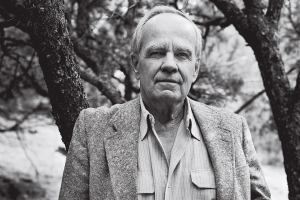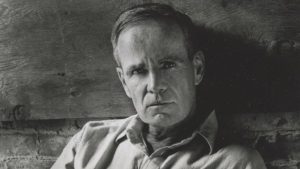Renowned American writer Cormac McCarthy hailed as one of the greatest literary figures of his time, passed away at the age of 89 on June 13. Throughout his lifetime, Cormac McCarthy crafted a remarkable collection of works, comprising 12 novels, two plays, five screenplays, and three short stories.
His writings predominantly explored the American South, delving into the themes of violence and often portraying apocalyptic scenarios. Comparable to esteemed authors such as William Faulkner and Herman Melville, McCarthy left an indelible mark on the literary landscape, solidifying his position as a titan among American writers.
With his pen as a compass, Cormac McCarthy guides us through landscapes both desolate and vibrant, weaving tales that explore the raw essence of existence. With masterful prose, he paints vivid landscapes, from the sun-bleached deserts to the haunting valleys and the forgotten corners of civilization.

Credits: The Indian Express
Also read-The Passenger by Cormac Mccarthy Review
Among Cormac McCarthy’s notable literary works are several renowned novels, including “All the Pretty Horses”, “No Country for Old Men”, and “The Road”. His novel “No Country for Old Men” was later adapted into a critically acclaimed film in 2007, sharing the same title and directed by the Coen brothers, Joel and Ethan.
The film went on to receive numerous Academy Awards, including the prestigious Best Pictures award. Interestingly, the novel itself originated from a screenplay written by McCarthy, showcasing his versatility as a writer who seamlessly transitions between different mediums of storytelling.
In 2022, Cormac McCarthy’s final literary works, “The Passenger” and “Stella Maris”, were released, marking the culmination of his prolific career. In response to McCarthy’s passing at the age of 89, Stephen King, an esteemed figure in American literature, expressed his sorrow, describing McCarthy as perhaps the greatest American novelist of his generation. King acknowledged McCarthy’s profound impact on the literary landscape, highlighting his extensive body of work and noting the deep sense of loss that accompanied his departure.
McCarthy’s distinctive prose
McCarthy received accolades for his unique writing style, often described as “dense”, “austere”, and occasionally even “weird”. His prose was characterized by its minimal punctuation, allowing the narrative to flow with an uninterrupted intensity. Within his works, McCarthy frequently portrayed deeply troubled characters and the violence that permeated their lives, presenting it in an explicit and unflinching manner. A prevailing sense of nihilism pervades his novels, yet some critics interpreted his later work as carrying a moralistic undertone, offering insights into the complexities of human nature and the consequence of one’s actions.
During a very rare interview with a renowned American media mogul Oprah Winfrey, McCarthy revealed his reference to “simple declarative sentences” in his writings. He went as far as denouncing semicolons as “idiocy”. These stylistic choices, along with the absence of quotation marks for dialogue and the omission of attributions, are distinct features that characterize McCarthy’s prose.
Also read-‘Real Love’ Revived: Mary J. Blige’s timeless piece captures 90s Nostalgic True Love

Credits: BookMarks Reviews
Also read-4 Months after Lisa Marie Presley’s death, Priscilla Presley and Riley Keough Settle the Family Fued
McCarthy’s vibrant literary themes
By giving up traditional punctuation and attribution conventions, McCarthy creates a unique narrative style that immerses readers in the raw intensity of his stories. McCarthy’s literary works often delve into recurring themes, such as individuals grappling with societal conflicts and the portrayal of authority figures, particularly those within law enforcement, as inept.
In a 2009 profile featured in The Guardian, McCarthy was characterized as “the great pessimist of American literature,” highlighting his propensity for depicting darker aspects of the human condition. He was further described as a “reclusive soothsayer” whose outlook on life surpasses even the perceived patience of Hemingway, creating a distinctive and unflinching narrative voice that delves into the depths of human nature.
McCarthy ventured into semi-autobiographical territory with his novel “Suttree”, which stood out for its deviation from his typical writing style. The book offers a portrayal of marginalized communities in the state of Tennessee, where McCarthy himself had spent his formative years.
Also read-Morgan Wallen Rejoices over his Vocal recovery: ‘Clear’ to Sing Again


